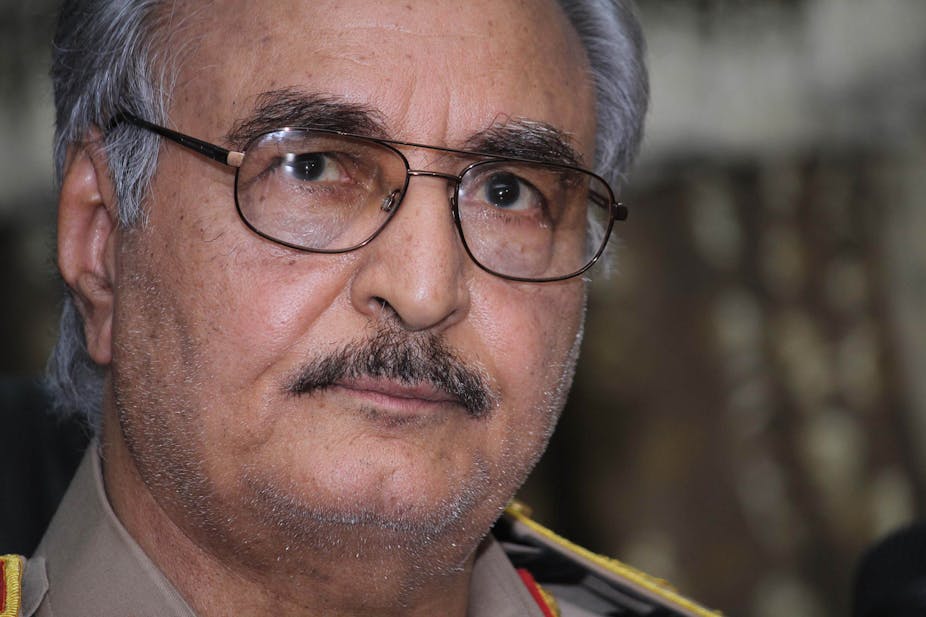The International Criminal Court (ICC) is under pressure to prosecute Libyan warlord Khalifa Haftar for crimes against humanity during the civil war that has devastated the country. London-based human rights lawyers Guernica 37 submitted a dossier to the court about Haftar and his forces that included allegations of torture, summary executions and excessive destruction.
Field Marshal Haftar is head of the Libyan National Army, the Western-backed force that helped overthrow former president Muammar Gaddafi in 2011. He is closely allied to the government based in the eastern city of Tobruk, which controls much of the country’s oil fields and has long refused to cooperate with the UN-endorsed rival administration in Tripoli led by Fayez al-Sarraj, the prime minister.
Yet regardless of the strength of the case against Haftar, the chances of him being prosecuted look slim. When it comes to pursuing would-be war criminals through the ICC, politics has a habit of getting in the way. Sadly, Libya is well on the way to becoming the archetypal example.
Selective indictments
Libya is not a party to the ICC’s founding statute, but the court has jurisdiction over the territory thanks to a referral from the UN Security Council in 2011. So far the ICC has issued five Libya-related arrest warrants, starting with three in the year of the referral: against Gaddafi himself, his son Saif al-Islam, and his brother-in-law and former head of intelligence Abdullah al-Senussi.

Two years later, in 2013, the court issued a warrant against Al-Tuhamy Mohamed Khaled, former head of the internal security agency. It wasn’t until this August that it indicted someone not connected to the Gaddafi regime – Mahmoud el-Werfalli, the field commander of the Special Forces Brigade (Al-Saiqa).
El-Werfalli is answerable to Haftar through Al-Saiqa’s close affiliation with the Libyan National Army. Indeed, the ICC chief prosecutor Fatou Bensouda recently directly appealed to Haftar to have el-Werfalli turned over, since he is accused of the torture and murder of 33 people in Benghazi.
Yet neither el-Werfalli nor the other indicted men have been brought to The Hague for trial. All but Gaddafi are alive, but the continuing chaos has made it difficult for police and security forces to extradite them. Many have also criticised the ICC for being political in its pursuits and practising one-sided justice that has favoured the anti-Gaddafi forces and ultimately the UN Security Council member states.
The reality is that war crimes have almost certainly been committed by all sides in this bloody conflict. Besides Guernica 37, another outfit named Lawyers for Justice in Libya, based in London and Tripoli, has been urging the court to be “more proactive” against claims of countless atrocities against civilians, including systematic male rape. Equally, the ICC should arguably look at the callous treatment of migrants in Libyan detention centres, since this too could qualify as a war crime.
Politics before justice?
The ICC’s reputation in Libya was not helped by allegations that its former chief prosecutor Luis Moreno Ocampo allegedly had business ties to a man closely linked to Haftar. It raises questions about whether it helped the warlord avoid indictment in the earlier years of the civil war.
After Ocampo was replaced by Fatou Bensouda in 2012, the policy of pursuing only Gaddafi henchmen appeared to continue. This year’s decision to indict el-Werfalli was on the face of it a welcome change of direction. Yet that happened after Bensouda paid a controversial visit to Qatar in July and met with the country’s foreign minister and emir, prompting claims the two events were linked.

Qatar has allegedly played a very important role throughout the Libyan conflict by supporting, alongside Turkey, the Islamist factions that have been fighting Haftar’s army. In turn, the eastern government of Libya has been backed by the likes of United Arab Emirates, the Saudis, Egypt and the Russians. When the Saudis and several other Middle Eastern countries cut off diplomatic relations with Qatar in June, so did Tobruk.
The reactions of France, the UK and the US to the latest pressure on Haftar have been striking – bear in mind they are three of the five permanent members of the UN Security Council that gave the ICC jurisdiction in Libya. When the court indicted el-Werfalli, these countries issued a joint statement welcoming an announcement from Haftar that he would investigate the claims against his subordinate. The statement made no explicit reference to the ICC or the arrest warrant, in a sign that the West was not backing Bensouda’s move.
In the face of the more recent calls for Haftar himself to be prosecuted, the same countries have been silent. With the French president, Emmanuel Macron, and the UK foreign secretary, Boris Johnson, both having held talks with Haftar in recent months, the West appears to have decided that any lasting peace requires his involvement.
This makes the ICC’s pursuit of el-Werfalli a mystery – putting pressure on Haftar and his henchmen via the court may undermine the warlord’s likely candidacy in next spring’s presidential elections. All the same, Haftar’s strong international support should ensure he is not indicted personally. The longer the court ignores him, the stronger the sense that prevailing political conditions are more relevant to ICC business in Libya than protecting and promoting human rights.
The ICC should operate in a fair manner free of double standards, but time and again it has failed to do so. Numerous African countries have objected to the disproportionate number of indictments against black leaders while, for example, Tony Blair has never been pursued over Iraq. Meanwhile, the ICC’s selective interventions in Uganda have prompted criticisms that it prioritises peace over justice.
The truth is that the international community’s attitude to justice and accountability risks fostering a culture of impunity for human rights violations. At best, non-Western countries take the ICC’s pronouncements with a pinch of salt. At worst, they see it as a modern vehicle for Western imperialism.

